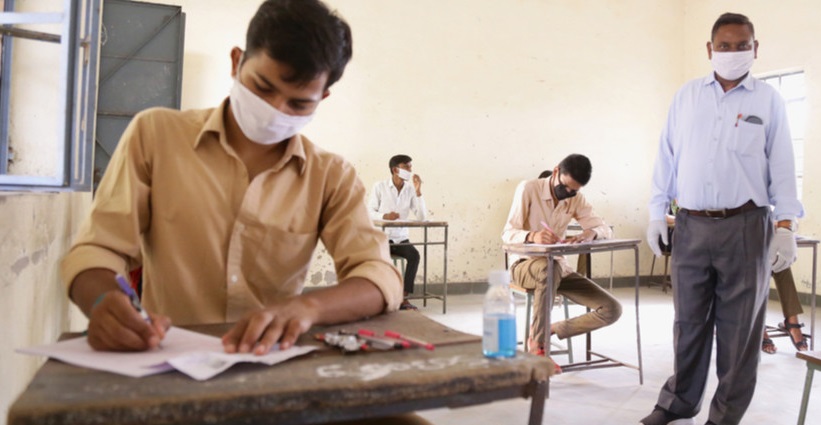India & World UpdatesHappeningsBreaking News
Union govt issues SOP on preventive measures to be followed while conducting exams

September 2: The Union Ministry of Health & Family Welfare on Wednesday released guidelines, Standard Operating Procedures (SOPs) on preventive measures to be followed while conducting examinations to contain spread of coronavirus. The SOP stated, “Examination centres are frequented by large number of students (as well as their parents) and staff till the entire duration of the exam and therefore, it’s vital to plan and conduct these examinations, while following specific preventive measures.”

. Generic preventive measures: The generic measures include simple public health measures that are to be followed to reduce the risk of COVID-19. These measures need to be observed by all (staff, students & parents)
in these places at all times. These include:
i. Physical distancing of at least 6 feet to be followed as far as feasible.
ii. Use of face covers/masks to be made mandatory.
iii. Practice frequent hand washing with soap (for at least 40-60 seconds) even when hands
are not visibly dirty. Use of alcohol-based hand sanitizers (for at least 20 seconds) can be
made wherever feasible.
iv. Respiratory etiquette to be strictly followed. This involves strict practice of covering one’s
mouth and nose while coughing/sneezing with a tissue/handkerchief/flexed elbow and
disposing off used tissues properly.
v. Self-monitoring of health by all and reporting any illness at the earliest.
vi. Spitting shall be strictly prohibited.
vii. Installation & use of Aarogya Setu App shall be advised to all, as far as feasible.
All Universities/ Educational Institutions/ Examination Conducting Authorities/ Examination centers shall specifically ensure the following arrangements:
a) Planning of examinations
i. Only those examination centers which are outside the containment zone shall be allowed to function. Staff/ examinees from containment zones shall not be permitted. Such examinees shall be given an opportunity to undertake the examination through other means or the Universities/Educational Institution shall arrange for taking exam at a later date for such students.
ii. Universities/ Educational Institutions/ Examination Conducting Authorities/ Examination centers may plan out the examination schedule in a staggered manner so as to avoid overcrowding at any examination center on any day.
iii. Keeping in view the physical distancing norms, institutions should have adequate room capacity to ensure proper seating arrangement for examination.
iv. Appropriate arrangements for personal protection gears like face covers/masks, and other logistic like hand sanitizers, soap, sodium hypochlorite solution etc. shall be made available by Universities/ Educational Institutions/ Examination Conducting Authorities/ Examination centers to the staff as well as students as per requirements.
v. Exam functionary and examinees may also submit self-declaration about health status at the time of entrance to the examination center. Such self-declaration form may be circulated at the time of issue of admit tickets. A simple do’s and dont’s/ Advisory may also be circulated at the time of issue of admit tickets.
vi. Students should also be given prior information on what they should carry,which includes exam related documents (Admit card, ID card etc) , face mask, water bottle, hand sanitizer etc.
vii. Adequate manpower shall be deployed by the Institution for maintaining discipline (to ensure observance to distancing norms and other preventive measures at all times) during conduct of the examination.
viii. Adequate number of registration rooms and manpower for document verification and recording of attendance shall be planned duly ensuring social distancing norms.
ix. Invigilators and supervisory staff need to be briefed on the code of conduct in the context of COVID.
x. Provisions must be made for display of Posters/standees/AV media on preventive measures about COVID-19 prominently at the examination center (outside and inside).
xi. The examination center should have a designated isolation room for isolating any person who is found symptomatic at the time of screening or during examination, till such time medical advice may be sought. A clear policy on allowing symptomatic candidates to undertake examinations shall be delineated by the Examination Conducting Authorities in advance.
b) Transportation to and from the examination center: If any transportation is arranged by educational institutions conducting examinations, proper sanitization of buses/other transport vehicles shall be ensured.
c) Entry and exit to the examination center:
i. Entrances to have mandatory hand hygiene and thermal screening provisions. If any examination functionary/ examinee fails to meet the self-declaration criteria, they shallnot be allowed entry.
ii. Only asymptomatic staff and students shall be allowed inside the examination hall.
iii. In regular course, a symptomatic candidate should be referred to the nearest health center and given an opportunity to undertake the examination through other means or the Universities/ Educational Institution shall arrange for taking exam at a later date when the student is declared physically fit. However, if a student is found to be symptomatic and insists on giving the examination, he may be allowed to take examination by shifting the
candidate to a separate isolation room. The permission in such cases shall be granted as per the policy already enunciated on the issue by the Examination Conducting Authorities.
iv. All staff and students to be allowed entry only if using face cover/masks. The face cover/mask has to be worn at all times inside the examination center by all.
v. Enough entry & exits gates for students and staff shall be ensured to avoid overcrowding.
vi. Maintaining physical distancing of a minimum of 6 feet, when queuing up for entry and inside the center as far as feasible.
vii. Specific markings may be made with sufficient distance to manage the queue and ensure social distancing in the premises.
viii. Proper crowd management in the examination center as well as outside premises like parking lots, waiting areas — duly following physical distancing norms shall be ensured.
ix. Bags/books/mobiles should not be allowed in the examination center.
x. The examinees will be taken to a registration room in batches maintaining adequate physical distancing norms for document verification and recording of attendance. Thereafter they will be escorted in batches to the allotted examination hall.
xi. Frisking of examinees, if needed, shall be undertaken after thermal screening. Personnel involved in frisking shall wear triple layer medical mask in addition to gloves. Proper hand hygiene shall be maintained by such personnel every time they change their gloves.
xii. On completion of exam, the candidates should be permitted to move out in an orderly manner
d) Special precautions for high risk individuals:
i. All staff that is at high risk (older employees, pregnant employees and employees who have underlying medical conditions) shall not be deployed for invigilation/conduct of examination.
ii. Such staff should preferably be deployed in tasks not requiring direct contact with the students.
e) Movement within the examination center, seating arrangement including conduct of examination:
i. Number of people in the elevators shall be restricted, duly maintaining physical distancing norms.
ii. Provision of wheelchairs, if warranted, should be ensured and these should be disinfected regularly.
iii. In case of PwD candidate availing a scribe, both the candidate and scribe must wear the masks and be made to sit with adequate physical distancing.
iv. Institutions may adopt contact less processes like OR code, online forms, digital signatures for the exam.
v. Adequate arrangements for safe drinking water (preferably with disposable cups/glasses) be made in the examination hall.
vi. Seating arrangement in the examination hall to be made in such a way that adequate social distancing is maintained.
vii. For pen & paper based tests, the invigilator will sanitize his hands prior to distribution of question papers/ answer sheets. The examinees will also sanitize their hands before receiving such papers and handing them back to invigilators. The collection and packing of the answer sheets, at every stage will involve sanitization of the hands. The answer sheets will preferably be opened up after 72 hours have elapsed post collection of papers.
viii. Use of spit/saliva for counting/distributing sheets shall not be allowed.
ix. Sharing of personal belongings/stationery shall not be allowed.
x. For online/computer based examination, the systems shall be disinfected using alcohol wipes before and after conduct of examination.
xi. Record of all exam functionaries/examinees shall be maintained in the system for future reference and traceability.
xii. For air-conditioning/ ventilation, the guidelines of CPWD shall be followed which emphasize that the (i) temperature setting of all air conditioning devices should be in the range of 24-30°C, (ii) relative humidity should be in the range of 40- 70%, (iii) re-circulation of air to be avoided to the extent possible, (iv) intake of fresh air should be as much as possible and (v) cross ventilation should be adequate.
f) Sanitation and Hygiene:
i. Examination hall and other common areas shall be sanitized each time before and afterexamination.
ii. Effective and frequent sanitation within the premises shall be maintained with particular focus on lavatories, drinking and hand washing stations/areas.
iii. Cleaning and regular disinfection (using 1% sodium hypochlorite) of frequently touched surfaces (door knobs, elevator buttons, hand rails, benches, washroom fixtures, etc.) to be made mandatory in all examination hall and other common areas.
iv. Students and staff should be advised to dispose of used face covers / masks in covered bins available at the center. The waste thus generated may be disposed off in accordance with the hazardous waste disposal guidelines.
g) SOP to be followed in case of a suspect case or person who develops symptoms during the conduct of examination:
i. Place the ill person in a room or area where they are isolated from others.
ii. The person will remain isolated while wearing a mask/face cover till such time he/she is examined by a doctor.
iii. The examinees exhibiting symptoms and willing to give the examination, may be allowed to take examination by shifting the candidate to a separate isolation room.
iv. If symptoms deteriorate, inform the nearest medical facility (hospital/clinic) or call the state or district helpline.
v. A risk assessment shall be undertaken by the designated public health authority (district RRT/ treating physician) and accordingly further action be initiated regarding management of case, his/her contacts and need for disinfection.
vi. Disinfection of the premises to be taken up if the person is found positive.
It was further stated that the SOP detailed above provides for minimum precautions to be followed during planning and conduct of examinations. Universities/ Educational Institutions/ Examination Conducting Authorities/ Examination centers may put additional measures in place as per their local assessment and in line with activities permitted by Ministry of Home Affairs (MHA) as per MHA orders issued under Disaster Management Act, 2005 from time to time.





